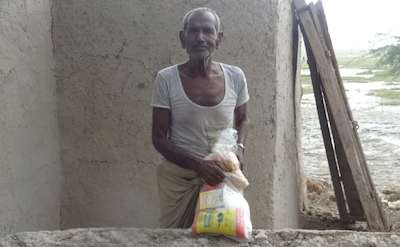
His aging body gives way incrementally; pain in his shoulders, knees, and a chronic cough are constant reminders of growing frailty. Yet still he gives thanks for life. Within this man exists a gentle strength; an unflinching devotion to provide for his family amidst a background of nature's extraordinary capacity for destruction.
A digital image captured this frail man with a kindly smile as he stood between the gray sky and a pile of collapsed earthen rubble. Almost ninety, Khushi Masih was starting over; one man among the hundreds of thousands affected by the 2013 monsoon: the most devastating flash floods to strike Pakistan in living memory.
The photograph seared my heart. It called out with a voice of its' own, refusing to become forgotten among the dozens of photos taken that August day.
Regarded as a quiet man of few words, Khushi Masih is the family patriarch, the husband of Husain Bibi, and a father to three sons and six daughters. His brood of grandchildren affectionately call him "Abba," which means loving father in his native Punjabi language.
Slum Dwellers
They are known as "katchi abadis," or slum dwellers. Like his forbears, Khushi Masih is a lifelong inhabitant of a Christian slum village called Kalar Abadi, situated on a grassy flatland near the outskirts of Sheikhupura.
Abadis are closely grouped one-room houses built by hand with compressed earthen mud or bricks. The roofs are fashioned from straw, screens, leaves and twigs, and vulnerable to rotting. Living conditions are raw and impoverished; no electricity, no potable water and no proper drainage system. Wells and basic latrine facilities remain scant to nonexistent in both urban and rural slums; lack of sanitation a breeding ground for the spread of germs.
Waterborne diseases account for almost half of all illnesses in Pakistan. Approximately two hundred thousand children die each year from diarrhea and dehydration. According to a 2012 report, successive governments have ignored the problem despite multilateral commitments to address it.
Further, these ostracized slum families often suffer the practice of generational bonded slave labor; universally condemned by the United Nations declaration of human rights. Poor, oppressed and illiterate families have no other recourse for survival but to mortgage their lifetimes and their labor as indebted workers in farm fields, brick kiln factories, and among hazardous industries. Estimates project up to one million men, women and children in bonded labor within Pakistan.
Helping Hands
What divides helplessness from hope are the deeds of others. Rahat Anwar Masih, Director of Grace Fellowship Ministries in Sheikhupura, described the conditions he encountered when his relief team arrived in Kalar Abadi:
"Khushi Masih and his sons and their families all lived in four mud huts. They were all destroyed," he said. "They were already going through rough circumstances and the flood added to their heavy burdens. They are trying to rebuild with the mud from their collapsed homes, but in vain."
Slowly, village families are provided tents for makeshift shelters. Some families are living under torn remnants. Destitute circumstances force them to accept rebuilding loans at high interest rates from their landlords, further increasing indebtedness from which there is no escape. Grace Fellowship Ministries is actively advocating to break the cycle of enslavement:
"We have already undertaken the responsibility of many of these children for their education and other expenses," explained Rahat Anwar Masih, "but we cannot undertake many more for our limited resources available."
Khushi Masih's determination to rebuild shelters and provide for his family reflects a strength of character to be celebrated in our fellow man, and reason enough to become involved in our mutually shared humanity.
The frail man with a kindly smile needs the compassion of helping hands. He stands between the sky and rubble in the photo, but there is someone else standing fast between hopelessness and gratitude. We do.
